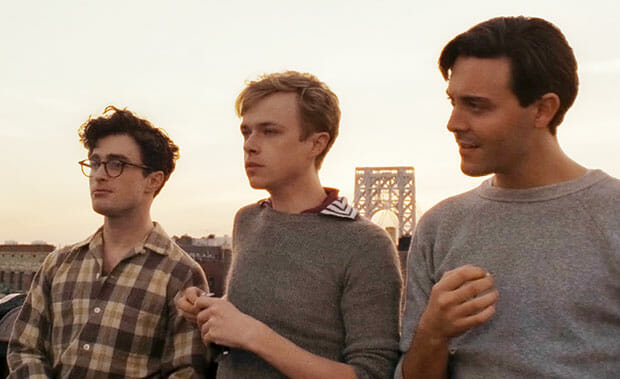Kill Your Darlings

As titular proclamations go, Kill Your Darlings is the year’s most gloriously evocative. (Take that, Only God Forgives.) Director John Krokidas perfectly captures the elation that goes along with breaking down convention for the sake of unfettered creation, specifically here with the fruitful nascence of Greenwich Village progressivism and the beat generation. The usurping clan—wide-eyed and eager Columbia University students Allen Ginsberg (Daniel Radcliffe), Jack Kerouac (Jack Huston) and Lucien Carr (Dane DeHaan)—frequent downtown jazz clubs and smoke-filled house parties, finding endless inspiration in the motley crowds of intermingling races, sexualities and ideologies. It’s a toothsome time of graspable change, when the sky had no limit and when fantasies came true.
The best reminiscences of this period come from the novelistic band-of-brothers most intrinsically linked with it; they were the scene’s most devoted participants. Unlike last year’s ill-fated adaptation of Kerouac’s On the Road, Krokidas’s film casts a wider net, tracing the inception of the movement that inspired those works by waxing nostalgic on the friendships and tribulations that occurred within. Darlings is an ensemble piece: Radcliffe’s Ginsberg may be the film’s ostensible protagonist, but his formative interactions and growing pains, and the catalysts for them, are just as legendary.
Daniel Radcliffe has exchanged Harry Potter’s lightning scar for Ginsberg’s dramatically coiffured hair and emo/hipster glasses. His Ginsberg first encounters rabble-rouser Lucien Carr in the Columbia University library during a guided tour: As a guide regales an audience on the university’s collection of important works and first editions, Carr animatedly recites Henry Miller, gyrating on a table and making a spectacle. Carr’s attempt to liberate this “restricted” book from the shackles of tradition’s oppression establishes a principal arc of the film’s trajectory, pitting the old and the new guard against one another.
In Carr, Ginsberg finds not only a muse but also a catalyst for his own personal expression; their creative relationship becomes romantic. Carr longs to develop new modes of written expression but lacks the necessary talent to do so. He magnetically externalizes that insecurity so as to draw people toward him who can help realize his dreams, people such as drug-addled existentialist William S. Burroughs (Ben Foster), and David Kammerer (Michael C. Hall), with whom he shares a longstanding and troubled love affair. By the time Kerouac’s sensitive alpha male enters the picture, the group is ready to share its manifesto, “the new vision,” and go about the business of contributing to it.
-

-

-

-

-

-

-

-

-

-

-

-

-

-

-

-

-

-

-

-

-

-

-

-

-

-

-

-

-

-

-

-

-

-

-

-

-

-

-

-








































